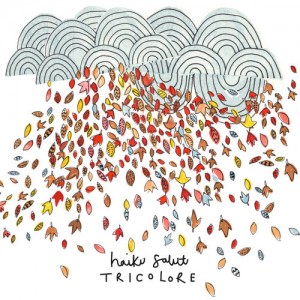According to Haiku Salut themselves, the sound they make is “Baroque-Pop-Folktornic-Neo-Classical-Something-Or-Other”. Whatever that is, they can safely claim to be Derbyshire’s premier exponents of it – a fact demonstrated on Tricolore, which helpfully comes with a series of wonderful drawings in the sleeve notes to explain where their ideas come from.
The most appropriate comparison to contemporary music I can make is to compare Haiku Salut to Beirut, given the Baroque influences in their music. Think of Beirut’s March of the Zapotec and you’ll know what to expect from Haiku Salut’s integration of electronic sounds into the music. While Tricolore is a fully instrumental vocal, there is nothing lacking without the voice of Zach Condon. The music is creative and interesting enough that it stands alone, without the need for lyrics.
The second track, ‘Sounds Like There’s a Pacman Crunching Away At Your Heart’ really illustrates the variety of sounds used by the band. With the intro Haiku Salut have constructed a wonderful, calming soundscape using guitars glockenspiel and piano. When the beat is introduced it really is reminiscent of the 8-bit soundtracks of Pacman, but these old and new sounds are fused wonderfully well.
At times those of us with folkier taste may find that the electronic sounds overpower the live instruments a little too much, for example in the intergalactic sounding ‘Leaf Stricken’ and the closing track ‘No, You Say It’, however this provides a further dimension to the album and does not diminish its musical credibility.
Tricolore is a fine achievement. Haiku Salut have combined traditional and contemporary instruments and technology to create a fascinating soundscape, with great textural depth and integrity. Though at times the album is intense and a challenge to listen to, this is worthwhile for highlights such as ‘Sounds Like There’s a Pacman Crunching Away At Your Heart’, ‘Los Elefantes’, ‘Watanabe’ and ‘Train Tracks for Wheezy’.
Words: Amelia Steele

